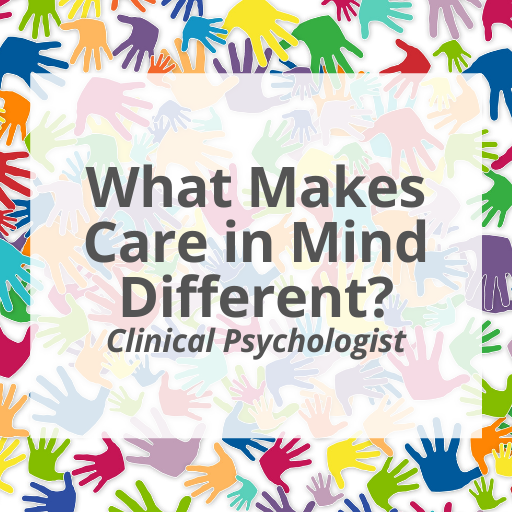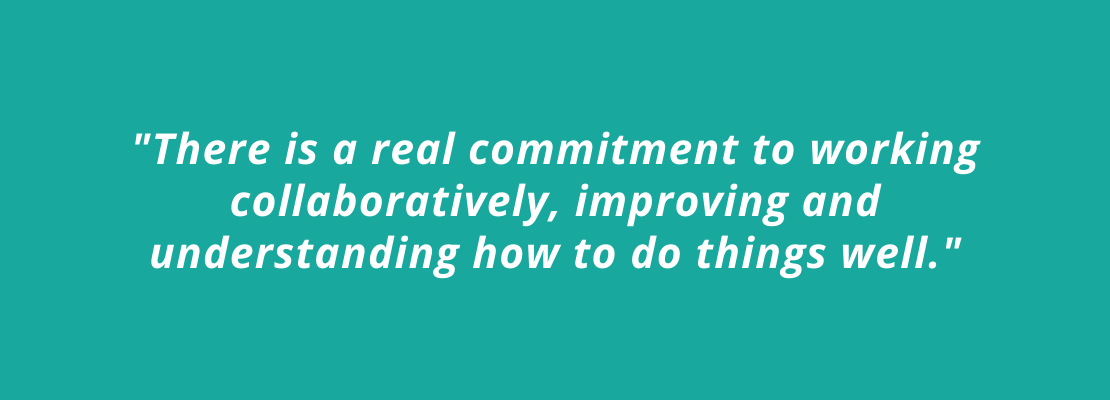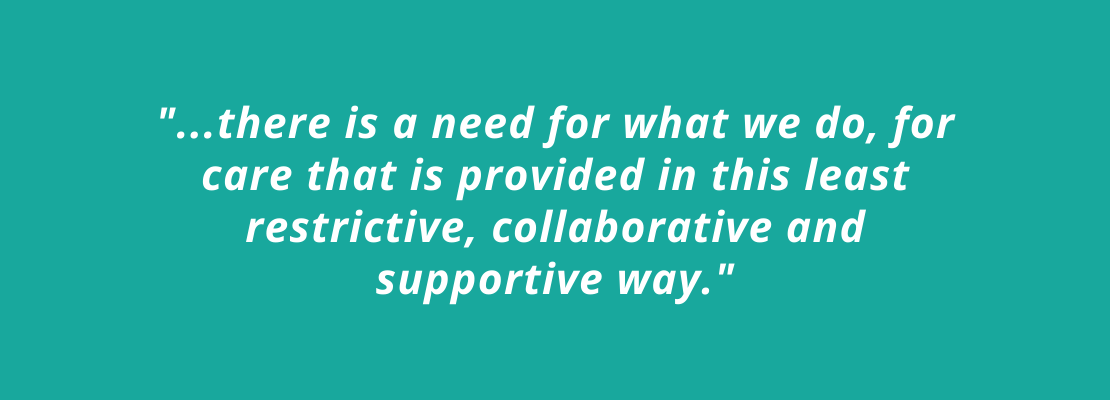25th Feb 2021
What Makes Us Different? – Clinical

At Care in Mind, there are many distinctive elements to how we do things, whether it’s our approach to therapeutic risk management or our specially trained clinical staff.
We are proud to offer care with a difference, and strive to ensure that our staff are well supported in doing the amazing job they do. Here, one of our Clinical Psychologists, Emma Williamson, shares why working for Care in Mind has differed from her previous experiences:
What makes us different?
Before coming to work here, I worked in other NHS services locally, and came to know about Care in Mind from working on an inpatient ward. We had referred some young people to the service, and I had heard good things. While I didn’t know anything in detail, there was just a general sense of the service being good. They seemed like a nice place to deal with and refer young people to.
So, when I saw a job advertised, I applied for it partly because it felt like somewhere I wanted to work, it seemed like a place that was very caring and compassionate and when I read up a little more, I really liked the therapeutic models and the general approach. Hearing about the homes, the environment provided, the ethos and how Care in Mind thinks about supporting young people just all sounded great. I thought, this is a place I would really like to work because it fits with everything that, during clinical training, you think you would like to be able to provide for someone.
Then, when I came to interview, what I really liked was that the Executive Management Group (EMG) at the time were all clinical with a background of working with young people in a clinical setting. They all seemed to really understand it from experience, and that is quite different to some other services, where sometimes those at the top making the decisions have not been able to have the clinical background experience, which really helps to provide a full understanding of what is important and needed. So, I really loved that from when the company had started, it had been clinicians who had created Care in Mind, and that their aims and ethos were based on that experience.
Also, in the years that I have worked here, I have experienced a real culture of openness, so it feels like it is okay to question. For example, if I was to say I think this process could be improved, it will then be a question of how can we better understand or act on that, and let’s look towards making changes. It’s not about doing things reactively, but more planning how we can understand something properly, how we can build processes around it, as well as considering what the research tells us and what kind of models are out there. There is a real commitment to working collaboratively, improving and understanding how to do things well.

How do you think the care we offer to young people is different compared to what other mental health residential services offer?
The complexity of how we understand young people, and the amount of time and attention we pay to really understanding them and what will help them individually to begin to be able to live well independently is definitely different here to my experiences in other settings. Having been through clinical training and worked in a variety of other environments, I think I hadn’t truly understood how to unpick and formulate risk, and to plan well to support someone with that until I joined Care in Mind. I had seen a lot of structured tick box assessments, descriptions of risk behaviours and incident logs. Here it is very different. At Care in Mind, we look a lot more at the context and what the function is, and how we might be able to support people in managing it differently.
Being with Care in Mind is certainly the first time I have truly felt therapeutic risk management has been understood and embraced. There’s a lot of talk about it in other care settings, but there are often difficulties in implementing it and there’s often a fear of ‘what if’. I think that having that least restrictive practice model and having the collaborative way of managing things together, and that understanding of what is going on with people is just brilliant; it makes things feel so much better.
What do you think has been our key to success?
I think we have a lot of fabulous staff throughout the company that have strived hard and are dedicated to providing the best care for our young people. Also, having seen across services what can influence culture, the commitment of the EMG is just amazing. Their ability and dedication to openness and to promoting a culture where it is possible to question, understand, and try new things out to strive to improve is something very special. I think some of it comes down to personality, but also many years of experience and really caring about striving to do the best possible for the staff teams and young people we support. So, there is certainly something really special about those people who are leading the ship! I think there is always that dedication to improve things and make changes where they need to be made, and I think that is really what has gotten us to this point.
How do you feel about our 10-year anniversary?
Reflecting on how the service has grown has been amazing. Having been with Care in Mind for just over four years, I remember staff telling me when I first arrived how much the service had grown just in the few months beforehand. We had started off as a very small service with the whole team based in one place, and when I joined we had just moved into Head Office, new people were joining, and staff teams were growing. Now, four years on, things have grown even more, and I think it’s great that we’re able to provide placements for so many young people.
It’s been quite challenging to say the least through Covid-19 working remotely and not seeing each other often, but our support staff and service user involvement teams have done so well in supporting our young people. They have found amazing ways to work creatively during a difficult time and seeing the work they’ve been doing has been impressive. There is just such an ethos of pulling together and getting each other through.
It’s a big milestone and I’m very excited. I think because it can be hard sometimes for people to understand our models and why we take the approach we take but the proof is in the pudding. Look at how we have grown; all of the young people and the positive outcomes highlight that there is a need for what we do, for care that is provided in this least restrictive, collaborative and supportive way. It’s not always easy but it’s so great to see that we have reached this milestone and have grown so much.

How do you see the future of Care in Mind?
There is such a need for a shift in mental health care to become more collaborative and move away from restrictive practices so with that in mind I can’t see anything other than continuing growth. Not just growing in the way that we have been, I think also a growth in the way we share our approach and aim to inspire other services too. I think that there is also a need for a shift in the way things are done sooner on in the process, even before hospital. It would be great to see us provide more support for how care is provided in other settings, and I think many ways this is already happening. Hospitals and other care providers often see the work we do and think that they want to try those methods too, which I think is really great. I’d really like to see this collaboration and outreach work continue and expand into other settings too.

